国際セミナー報告書「各国のソーシャル・ファームに対する支援」
講演2 資料
ドイツにおけるソーシャル・ファーム
障害者のために有意義な雇用を創出するには
2007年1月 東京ゲーロルド・シュワルツ
論題
- 定義および価値基準
- 職場における統合を背景としたソーシャル・ファーム
- 法的な枠組みと支援サービス
- 特徴と効果
- 教訓-成功の秘訣
- 最新事情および展望
ソーシャル・ファームとは?
- ソーシャル・ファームとは、障害者或いはその他の労働市場において不利な立場にある人々の雇用のためにつくられたビジネスである。
- ソーシャル・ファームは、その社会的任務を遂行するために市場志向の商品の製造およびサービスを提供するビジネスである。
- ソーシャル・ファームに雇用されているかなりの数の人々は、障害者或いはその他の労働市場において不利な立場にある人々である。
- 各労働者は、仕事に応じた賃金や給料を、市場の相場によって支払われる。
- 労働の機会は、不利な立場にある従業員と、不利な立場にはない従業員とに、平等に与えられる。
- すべての従業員は、雇用に関して同等の権利と義務を持つ。
ソーシャル・ファームの定義は、1997年のCEFEC(精神障がいを持つ人の就労に関する欧州会議)による定義から引用。
ソーシャル・ファーム共通の価値基準
Enterprise(エンタープライズ:企業)
ソーシャル・ファームは市場志向と社会的任務とを結び付けたビジネスである。-「取引するプロジェクト」よりも、むしろ「支援するビジネス」
Employment(エンプロイメント:雇用)
すべての従業員に、支援と機会、そして有意義な仕事を提供する職場環境を備えている。
Empowerment(エンパワメント:地位向上)
ソーシャル・ファームは雇用を通じた障害者の社会的経済的統合を約束する。この目的を達成するための重要な手段は、すべての従業員に市場の相場に従って賃金を支払うことにより、経済的な地位向上をはかることである。
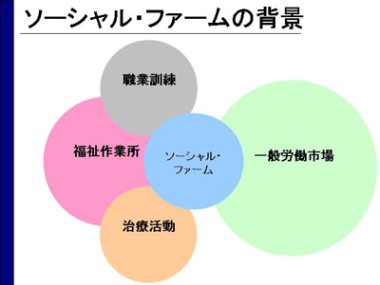
ソーシャル・ファームに関する重要な事件
- 1970年代末、ドイツで最初の「自助」企業設立
- 1985年連邦ソーシャル・ファーム協会設立
- 1985年ソーシャル・ファームの数が100を越える
- ソーシャル・ファーム発展のためのプログラムに政府およびEUが資金提供
- 連邦政府および地方政府の資金により数件の調査を実施
- 2000年ソーシャル・ファーム法
- 2001年以降、あらゆる政党の関心が高まる-ソーシャル・ファーム「ブーム」
- ソーシャル・ファームの専門化とニッチ・マーケットからの支援-ビジネスを主流にのせるために
- 民間企業および福祉作業所との連携の増加
ソーシャル・ファームに関する統計
- ドイツ全土に710のソーシャル・ファーム(2006*年3月現在)
- 全体でおよそ25,000件の仕事:
13,000件は障害者のための仕事
12,000件はその他の人々の仕事 - ソーシャル・ファームの従業員数は、一社平均40人
- ソーシャル・ファームの年間総売上高は、一社平均50万ユーロ
*BAGIntegrationfirmen.2006年3月の内部調査より
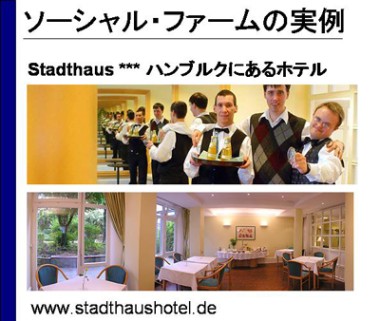
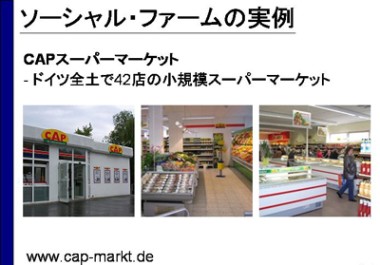

政府による支援
基本方針:
不利な条件の補償および投資支援-市場での競争に有利に働くような一般的な補助金または資金提供はしない
- 投資補助金/貸付金:
職場一件につき25,000ユーロ - 障害者への給与支払いに関する財政支援:
40%-3年間まで - 障害者の低い生産性を補償:
2年間10-30%更新可 - ビジネスコンサルティングを受けるための補助金:
新規のソーシャル・ファームは4,500ユーロ
既存のソーシャル・ファームは2,000ユーロ - 間接的な支援:非営利企業とみなす=低い売上税、利益は非課税(利益の運用は慈善目的に限る)
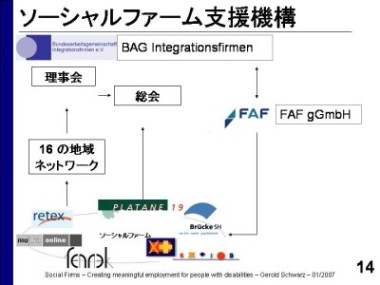
支援機構
BAGIntegrationfirmen
- ドイツにおける全国的なソーシャルファーム協会
- 700を越える会員
- ロビー活動および社会意識の向上
- 新たなプログラムの提案
FAFgGmbH
BAGIntegrationfirmenの100%子会社
-4つのオフィス
ソーシャル・ファーム支援サービスを提供:
- ビジネスに関する相談-実現の可能性と継続性に焦点
- インテリジェントビジネス概念-市場情報、ビジネスの成功事例及び雇用創出に焦点を当て組み合わせる
- ソーシャルファームマネージャを対象とした専門的な研修
- 研究および評価
- 支援開発プロジェクトの開発、運営および調整
FAFの活動例
-ソーシャル・ファームの経済分析:
- ソーシャル・ファームの費用効果分析
- 公的資金の最高150%の金額が税金および社会保険料として政府に償還される
- 平均してコストの70%にあたる額の収入が市場で得られる
FAFは、ソーシャルファームに関する情報と推進のための政府のパートナーです。
ソーシャル・ファームの効果
- ソーシャル・ファームは、重度障害者が経済的に自立した一人の人間として、完全に社会参加することを支援してきた
- ソーシャル・ファームは、障害者を社会における納税者に変える
- 長期的に見てソーシャル・ファームは、公開市場で独自に収入を得、公的資金援助を受けない高いレベルにまで到達することができる
教訓-成功の秘訣
個人レベル:
- 障害者の能力および創造的可能性-研修および開発
企業レベル:
- 価値基準、製品および市場に特に注目-クリティカル・マス(最低限の市場普及率)の達成と連携
外部の要素:
- 専門家による支援、ネットワーク作り、および不利な条件の補償
最新事情および展望
- バリューチェーン上部(企業内のサービス部門)への進出
- 民間企業との連携によるアウトソーシング(フォルクスワーゲン社の自転車)
- 企業買収
- 民間企業とのジョイントベンチャー
- サービスの「インソーシング」.慈善事業として設立されたソーシャル・ファームが親会社にサービスを提供
- 成功したソーシャル・ファームのレプリカ、フランチャイズ事業、ライセンス事業
- 福祉作業所からの関心の高まり-障害者全国大会で、作業所よりもソーシャル・ファームでの雇用を要求する宣言を発表
- 政府による新たなイニシアティブ:4000人の障害者に雇用の道を-うち1000人はソーシャル・ファームでの雇用を-しかし、割り当て制度の結果収入は減少
- 更なる国際交流と連携
更に詳しい情報は
www.bag-integrationsfirmen.de
www.faf-gmbh.de
ゲーロルド・シュワルツ(Gerold Schwarz)
gerold.schwarz@gmail.com
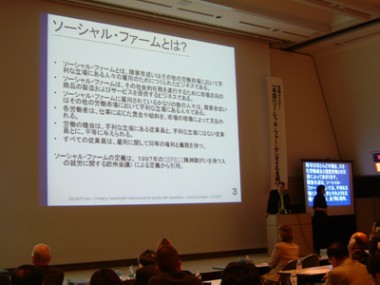
Social Firms in GermanyCreating meaningful
employment for people with disabilities
Tokyo - January 2007 Gerold Schwarz
Agenda
- Definition and values
- Social Firms in the context of vocational integration
- Brief historical background and data
- Characteristics and Impact
- Lessons learned - success factors
- Recent developments and outlook
What is a social firm?
- A Social Firm is a business created for the employment of people who have a disability or are otherwise disadvantaged in the labour market.
- It is a business which uses its market-orientated production of goods and services to pursue its social mission.
- A significant number of its employees will be people with a disability or other disadvantage in the labour market.
- Every worker is paid a market-rate wage or salary, appropriate to the work.
- Work opportunities should be equal between disadvantaged and non-disadvantaged employees.
- All employees should have the same employment rights and obligations.
Definition of a Social Firm from CEFEC, Confederation of European Firms, Employment Initiatives and Co-operatives, 1997
Social Firm common values
Enterprise
Social Firms are businesses that combine a market orientation and a social mission - 'businesses that support' rather than 'projects that trade'
Employment
The working environment is one that provides all employees with support, opportunity and meaningful work.
Empowerment
Social Firms are committed to the social and economic integration of disabled people through employment. A key means to this end is economic empowerment through the payment of market wages to all employees.
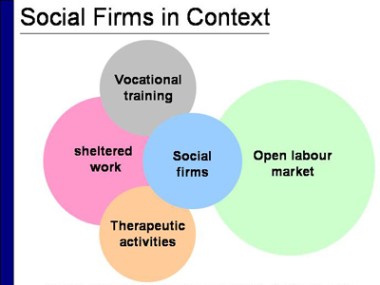
Social Firm Milestones
- Late 1970ies first “self-help” firms in Germany
- National Social Firm Association established in 1985
- Over 100 social firms in 1985
- Government and EU funded programmes to develop social firms
- Several surveys funded by National and Regional Government
- Law on Social Firms in 2000
- After 2000 growing interest from all political parties - social firm “wave”
- Professionalisation of social firms and support - from niche markets - to mainstream businesses
- Increasing partnerships with private sector and sheltered workshops
Social Firm Current Numbers
- 710 social firms in Germany (March 2006*)
- Approx. 25,000 jobs in social firms:13,000 jobs for people with disabilities12,000 jobs for other people
- On average 40 employees per social firm
- On average 0.5 Mio EUR annual turnover/ social firm
* BAG Integrationsfirmen - internal survey 03/2006
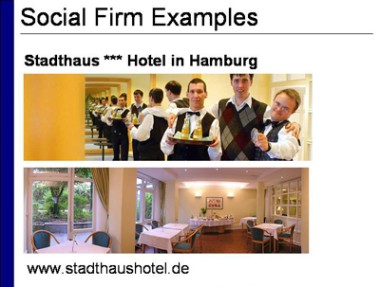
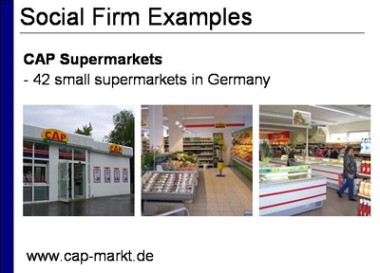

Government Support
General Principle:
Compensation of Disadvantages and Support for Investment - no general subsidies or funding that affects competitive advantage
- Grants/ Loans for Investment:
25,000 EUR per workplace - Financial support for salaries for people with disabilities:
40% - up to 3 years - Compensation for lower productivity of people with disabilities:
10 - 30% 2 years, renewable - Business Consultancy:
4,500 EUR for start-up, 2,000EUR existing social firm - Indirect Support:
Non-profit status = lower VAT, no tax on profit (profit must only used for charitable means)
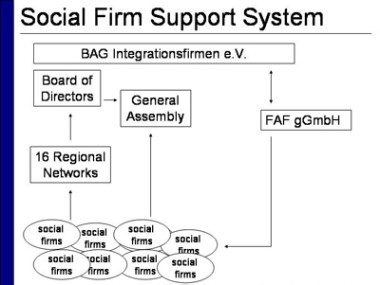
Support Systems
BAG Integrationsfirmen
- National Association of social firms in Germany
- Over 700 members
- Lobby work and awareness raising
- Conferences and networking
FAF gGmbH
100% owned by BAG IF - 4 offices
Business support services for social firms:
- Business Consultancy - focus on feasibility and viability
- Intelligent business concepts-combination of market intelligence, best practice in business and focus on employment creation
- Specialised training for social firm managers
- Research and Evaluation
- Development, Management and Co-ordination of support - and social firm development projects
Examples of FAF’s Work-Economic Analysis of Social Firms:
- Analysis of cost and benefits of social firms
- Up to 150% of public funding flows back to Government through taxes and social security contributions
- On average 70% of cost earned on the market
FAF is the main partner for Government for social firm intelligence and development
Social Firms Impact
- Social firms have helped people with serious disabilities to fully participate as economically independent members of society
- Social firms turn people with disabilities into tax-paying members of society
- In the long run social firms procure their own income on the open market and can reach a high level of independence from public funding
Lessons learned - Success Factors
Individual level:
- Abilities and creative potential of people with disabilities - training and development
Business level:
- Strong focus on value, product and market - critical mass and co-operation
External factors:
- Professional support,networking and compensation of disadvantages
Recent Developments and Outlook
- Moving up in the value chain - i.e. in company Services
- Outsourcing partnerships with private enterprises (i.e. bicycles for VW)
- Purchase of companies
- Joint-venture with private companies
- “In-sourcing” of services - social established by charities to provide services to mother organisation
- Replication, Franchising, Licensing
- Growing interest from Sheltered Workshops “Deutzer Erklaerung”
- New Government Initiatives: i.e. 4000/1000 jobs for people with disabilities - however, decreasing income from quota system
- Further international exchange and co-operation
Further Information
www.bag-integrationsfirmen.de
www.faf-gmbh.de
Gerold Schwarz
gerold.schwarz@gmail.com
